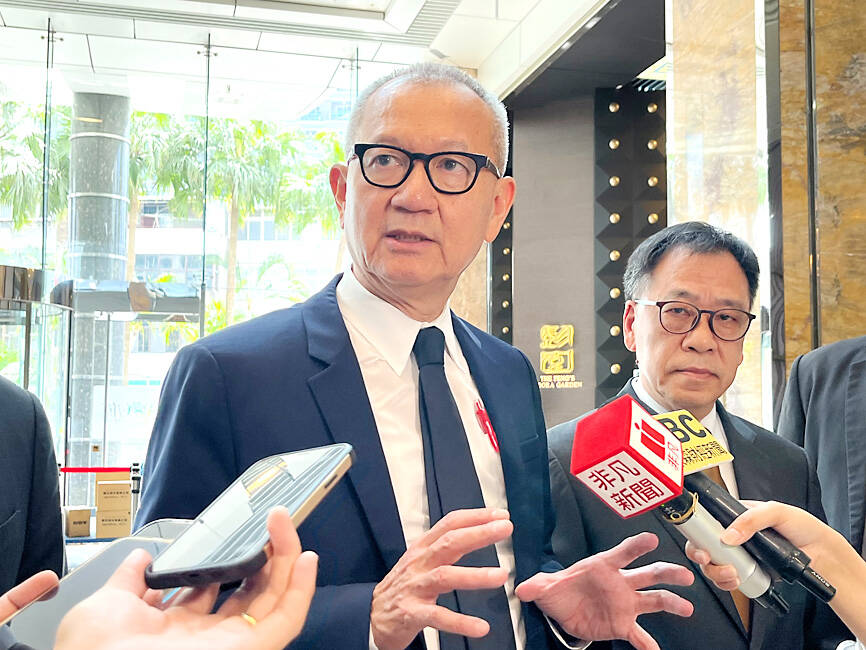Yageo Corp (國巨), the world’s third-largest multilayer ceramic capacitor supplier, said that it had acquired France-based Schneider Electric’s sensor business in a deal worth about 723 million euros (US$788.26 million).
The acquisition of Telemecanique Sensors early this month matched Yageo’s shift in strategy to offer premium products, the company said in a statement on Tuesday.
Yageo expects the deal to broaden its product portfolio and raise its gross margin substantially next year, given that Telemecanique Sensors focuses on making higher-margin chips for industrial devices, the company told investors during an online conference on Oct. 26.

Photo: CNA
Yageo’s gross margin fell to 33.2 percent last quarter from 38.5 percent a year earlier, as weak demand resulted in lower factory utilization.
However, the company said it remained on target to boost gross margin to 40 percent in the long term.
Telemecanique Sensors — a leading global specialist in the design, development and delivery of mission-critical electromechanical and electronic sensors — registered a compound annual growth rate of 5.5 percent in revenue over the past three years, with annual revenue averaging US$330 million, the statement said.
North America and Europe are its biggest markets, contributing about 70 percent to Telemecanique Sensors’ revenue, Yageo said.
Telemecanique Sensors operates five manufacturing sites in France, Indonesia, Mexico and the US, it said.
Yageo said it is still grappling with a severe inventory correction cycle, which has depressed customer demand, adding that it would take another one or two quarters for customers to deplete excess inventory before needing to restock.
Unlike previous downcycles, it is taking longer than expected for customers to digest inventory, as sluggish demand from the Chinese market has compounded already unhealthy inventory levels and weak end-demand in the post-COVID-19 period, Yageo said.
Yageo CEO David Wang (王淡如) said this quarter and next quarter would mark the trough for the firm.
Revenue this quarter would contract about 5 percent sequentially, Wang said.
In the best-case scenario, next quarter’s revenue could reach a similar level to this quarter, he said, adding that the forecast did not factor in benefits from acquiring Telemecanique Sensors.
Overall, Yageo saw its book-to-bill ratio improve to about 1 this quarter, he said.
The improvement was more evident in its commodity products, which had seen the book-to-bill ratio drop below 1 due to sagging demand, he said.
Demand for high-end products has been stable, he added.
Demand from the computer segment, which includes notebook and desktop computers, smartphone and telecom-related devices, continued to diminish this quarter, Yageo executive vice president of global sales and marketing Claudio Lollini, said.
However, demand for components used in servers, vehicles, and industrial and medical devices is increasing, Lollini said.
Gross margin would be flat this quarter on a sequential basis, while utilization would also be the same as last quarter, with equipment usage for premium products remaining at about 70 percent, Wang said.

Taiwan Semiconductor Manufacturing Co (TSMC, 台積電) secured a record 70.2 percent share of the global foundry business in the second quarter, up from 67.6 percent the previous quarter, and continued widening its lead over second-placed Samsung Electronics Co, TrendForce Corp (集邦科技) said on Monday. TSMC posted US$30.24 billion in sales in the April-to-June period, up 18.5 percent from the previous quarter, driven by major smartphone customers entering their ramp-up cycle and robust demand for artificial intelligence chips, laptops and PCs, which boosted wafer shipments and average selling prices, TrendForce said in a report. Samsung’s sales also grew in the second quarter, up

On Tuesday, US President Donald Trump weighed in on a pressing national issue: The rebranding of a restaurant chain. Last week, Cracker Barrel, a Tennessee company whose nationwide locations lean heavily on a cozy, old-timey aesthetic — “rocking chairs on the porch, a warm fire in the hearth, peg games on the table” — announced it was updating its logo. Uncle Herschel, the man who once appeared next to the letters with a barrel, was gone. It sparked ire on the right, with Donald Trump Jr leading a charge against the rebranding: “WTF is wrong with Cracker Barrel?!” Later, Trump Sr weighed

HEADWINDS: Upfront investment is unavoidable in the merger, but cost savings would materialize over time, TS Financial Holding Co president Welch Lin said TS Financial Holding Co (台新新光金控) said it would take about two years before the benefits of its merger with Shin Kong Financial Holding Co (新光金控) become evident, as the group prioritizes the consolidation of its major subsidiaries. “The group’s priority is to complete the consolidation of different subsidiaries,” Welch Lin (林維俊), president of the nation’s fourth-largest financial conglomerate by assets, told reporters during its first earnings briefing since the merger took effect on July 24. The asset management units are scheduled to merge in November, followed by life insurance in January next year and securities operations in April, Lin said. Banking integration,

LOOPHOLES: The move is to end a break that was aiding foreign producers without any similar benefit for US manufacturers, the US Department of Commerce said US President Donald Trump’s administration would make it harder for Samsung Electronics Co and SK Hynix Inc to ship critical equipment to their chipmaking operations in China, dealing a potential blow to the companies’ production in the world’s largest semiconductor market. The US Department of Commerce in a notice published on Friday said that it was revoking waivers for Samsung and SK Hynix to use US technologies in their Chinese operations. The companies had been operating in China under regulations that allow them to import chipmaking equipment without applying for a new license each time. The move would revise what is known